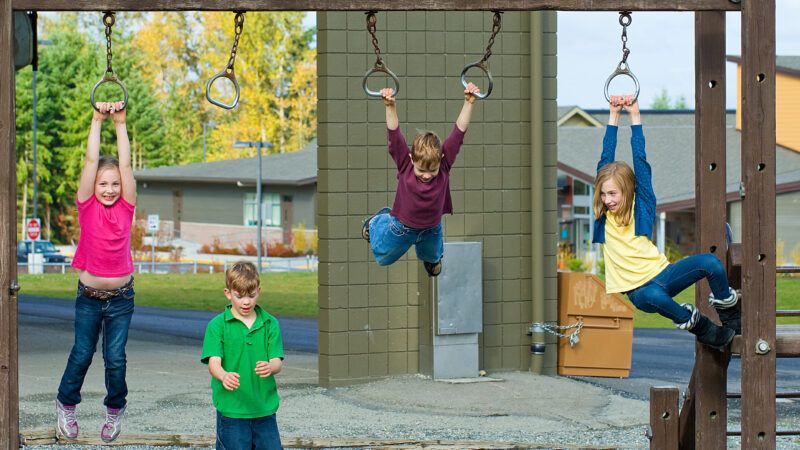Elementary Schools Ban Tag, Football, and Fun During Recess
"It really feels as though maybe we've lost touch with what's developmentally appropriate," says one Montgomery County mom.

A mom recently went to her daughter's Maryland elementary school to ask why the kids aren't allowed to play tag at recess—or even to close their eyes.
"We'd recently transferred from another district and my daughter was taken aback by how many rules there were," said the mom, whose name is being kept private to protect her identity.
There are indeed a lot of rules at the girl's new school—four typed pages of them. The mom found this out after the school administrator handed her a copy of the "Montgomery County Public Schools Playground Supervision Recess Procedures for Playground Aides." It states, among other things:
- Baseball and football games are not permitted at any time.
- Haphazard running, chasing and tag games on the blacktop are not permitted.
- A student may not begin to swing on rings and bars until the student ahead of him/her has finished.
Once they do swing or climb, they must use an "opposed thumb grip." (As opposed to their teeth?)
The rules also instruct playground aides to "caution children if it appears that emotions and excitement are mounting to a point where incorrect actions may soon result."
After the mom sent me the rules, I contacted the Montgomery County office in charge of recess safety. They did not respond.
"It really feels as though maybe we've lost touch with what's developmentally appropriate," the mom told me.
An administrator who met with the mom explained that the school's primary job is to keep children safe at all times. The mom disagrees; a school's primary job is to teach children and avoid interfering with their development.
Boston College Psychology Professor Peter Gray feels similarly.
"These rules demonstrate no trust at all of the children, nor even of the playground supervisors," says Gray, a co-founder of my non-profit, Let Grow. "When we treat people as irresponsible, they become irresponsible."
The mom said she felt a bit sorry for the administrator, who had no say in these rules. (Just like the kids.) And she added that today's children really do seem a little rough when they play tag—probably because they've had so little practice at it.
I have heard this from other people who work with children, especially occupational therapist Angela Hanscom, who notes that when kids don't move enough, they fail to develop proprioception, the ability to know where their body is in space and how much force it needs to do something physical.
All the more reason to let kids start adjusting to each other in the easiest, most natural way possible: through play.
In his new book, The Anxious Generation, Jonathan Haidt recommends bringing more play into kids' lives by keeping Friday afternoons free so kids can play in the neighborhood. He also recommends that schools stay open before or after school for mixed-age free play in a no-phone zone: what we call a "Let Grow Play Club." (Haidt is another co-founder of Let Grow. Our Play Club materials are here, for free.)
Depriving kids of play in the name of safety is dangerous. Even more dangerous than two kids using the climbing rings at once.


Show Comments (54)